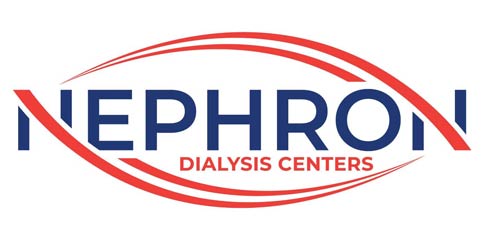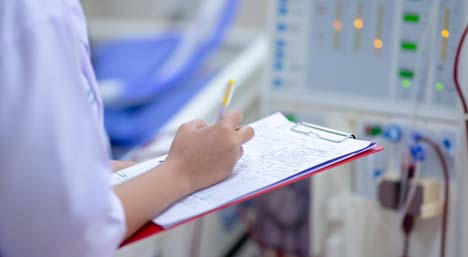Hemodialysis
If I Have Kidney Disease, Will I Need Dialysis?
In the early stages of chronic kidney disease, you do not need dialysis. These stages can last for many years. But if your kidneys fail, you will need dialysis or a kidney transplant to keep you alive.
When Should I Start Dialysis?
National Kidney Foundation guidelines recommend you start dialysis when your kidney function drops to 15% or less - or if you have severe symptoms caused by your kidney disease, such as: shortness of breath, fatigue, muscle cramps, nausea or vomiting. Your doctor will help you decide when to start dialysis, based on results of lab tests that measure how much kidney function you have left and on your symptoms.
Private insurance generally covers treatment for kidney failure whenever your doctor says it is needed. If you don't have private insurance, you may be able to get coverage through federal or state funded health care programs, such as Medicare or Medicaid.
Most people (about 93% of those who apply) qualify for Medicare when they need dialysis or a transplant, even if they are under age 65. Medicare pays for 80% of treatment costs of kidney disease when kidney function has dropped to 10-15%, or when your doctor justifies it.
If you are not having symptoms, you may be able to wait a bit longer. However, some doctors believe that starting dialysis as soon as Medicare or insurance covers it is wise, since it can take a long time to recover if you let yourself get very ill. Since chronic kidney failure often happens slowly, sometimes people do not even know how bad they feel, until they start dialysis and begin to feel much better.
It is important to start getting ready for dialysis or a transplant well in advance - when your kidney disease reaches Stage 4 (severe, with glomerular filtration rate, or GFR, less than 30 mL/min). Learning about the types of dialysis and transplant options will help you make a choice that is best for you. (Check out the rest of this section on "About Chronic Kidney Disease" for educational resources from DaVita.) Any type of dialysis will require surgery - usually outpatient - to allow access for your treatments, and this should be done well in advance to allow time for healing.
Who Pays for Dialysis?
Dialysis is paid for with your health insurance and Medicare (even if you are under age 65). If you have an employer group health plan, it will pay first for 30-33 months, and Medicare will be secondary (paying some or all of the balance your insurance doesn't cover). After 30-33 months, Medicare pays first and your health plan is secondary.
Ask your dialysis or transplant center to help you figure out what your insurance will pay and how much you will be expected to pay out-of-pocket. You can also call DaVita Guest Services at 1-800-244-0680 from 6 a.m. to 5 p.m. (PST).
Once I am on Dialysis, Will My Kidneys Get Better?
The chances that your kidneys will get better depend on what caused your kidney failure. Kidney failure is divided into two general categories, acute and chronic. Acute (or sudden) kidney failure is often temporary. In chronic kidney failure, the kidneys normally do not heal.
In acute kidney failure, when kidneys stop functioning due to a sudden stress, kidney function may recover. But when the damage to your kidneys has been continuous and progressive over a number of years, as it is in chronic kidney disease (CKD), then the kidneys usually do not get better. When CKD has progressed to end stage renal disease (ESRD), it is considered irreversible.
Causes of Acute Kidney Failure
Typical causes of acute (sudden) kidney failure are:
- Insufficient blood supply to the kidneys
- Obstructed urine flow
- Reactions to allergens, toxic substances, or an acute autoimmune attack on the kidneys
Causes of Chronic Kidney Failure
Typical causes of chronic (gradual) kidney failure are:
- Type I and Type II diabetes
- High blood pressure
- Glomerulonephritis (inflammation of the glomeruli, the tiny clusters of blood vessels that filter your blood)
- Polycystic kidney disease
- Long-term autoimmune attack on the kidneys
- Prolonged urinary tract obstruction
If your chronic kidney disease was not diagnosed until you were at the point of needing dialysis or a transplant, then it may seem sudden to you. However, the gradual injuries to your kidneys that occurred over a number of years caused permanent damage.
If you have acute kidney failure, you may need dialysis for only a few days or weeks while your kidneys recover. If your kidneys are too badly damaged to recover their function, then you will need long-term dialysis or a kidney transplant to live.
If it seems that your kidneys are recovering, talk to your doctor to learn whether it could be true. Tests can be done to determine whether your kidney function has improved.



